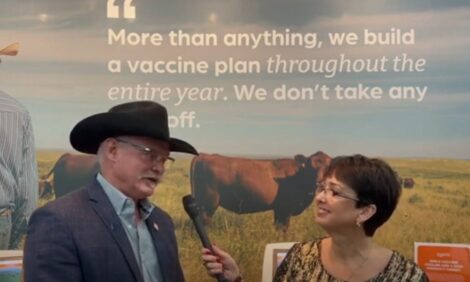



Beef Lasagne Contained Horse Meat
UK - Meat found in beef lasagne produced by Findus Foods has been found to be 60 per cent horse meat and in some cases higher.The contents of the product were discovers as part of the British Food Standards Agency's ongoing investigation into mislabelled meat.
The Food Standards Agency confirmed that the meat content of beef lasagne products recalled by Findus has tested positive for more than 60 per cent horse meat.
Findus withdrew the beef lasagne products after its French supplier, Comigel, raised concerns about the type of meat used in the lasagne.
"We have no evidence to suggest that this is a food safety risk. However, the FSA has ordered Findus to test the lasagne for the veterinary drug phenylbutazone, or 'bute'. Animals treated with phenylbutazone are not allowed to enter the food chain as it may pose a risk to human health," the FSA said.
The Findus beef lasagne was distributed to the main UK supermarkets and smaller convenience stores.
Findus has already begun a full recall of these products.
People who have bought any Findus beef lasagne products are advised not to eat them and return them to the shop they bought them from.
A statement from Findus said: "At Findus UK we are committed to our customers and the quality of our products. Following a thorough investigation, Findus UK can confirm that testing of its beef lasagne, produced by a third party supplier and not by Findus, has revealed some product containing horse meat.
"As a precautionary measure, on Monday we coordinated a full withdrawal of our affected beef lasagne in the following sizes - 320g, 360g and 500g, from all retailers. All other Findus products have been tested and are not affected.
"We understand this it is a very sensitive subject for consumers and we would like to reassure you we have reacted immediately. We do not believe this to be a food safety issue.
"We are confident that we have fully resolved this supply chain issue. Fully compliant beef lasagne will be in stores again soon.
"We would like to take this opportunity to apologise to our customers for any inconvenience caused."
Environment Secretary Owen said: "It is completely unacceptable that a product which says it's beef lasagne turns out to be mainly horsemeat. Consumers have a right to expect that food is exactly what it says on the label.
"The presence of unauthorised ingredients cannot be tolerated. This is especially true when those ingredients are likely to be unacceptable to consumers, or where there is any conceivable risk to human health.
"The responsibility for the safety and authenticity of food lies with those who produce it, and who sell or provide it to the final consumer. I know that food producers, retailers and caterers are as concerned as we are at the course of recent events.
"The FSA is urgently investigating individual suspicious incidents, which they have taken up with authorities and police across Europe.
"The FSA and Defra are also conducting a survey of processed beef products in the UK - including supplies to schools and hospitals - in order to assess whether there are any significant levels of improperly described meat.
"In addition, the food industry agreed on Monday at their meeting with Food and Farming Minister David Heath and the FSA that they would share the results of their own testing with the FSA and make the results publicly available. David Heath is meeting major food businesses again for a further update on Wednesday 13 February.
"The FSA has today requested that producers and retailers test all their processed beef products by the end of next week for the presence of horsemeat, and for residues of the veterinary medicine 'bute'.
"The Food Standards Agency, Defra, and the Department of Health are working closely with businesses and trade bodies along the whole food chain to root out any illegal activity and enforce food safety and authenticity regulations. Consumers can be confident that we will take whatever action we consider necessary if we discover evidence of criminality or negligence."
Bute is not allowed in the food chain because in humans it can cause rare cases of a serious blood disorder, aplastic anaemia. Because it is not possible to say what triggers the anaemia, it is not possible to identify a safe level of residue in meat.
Bute was banned from use in humans after it was found that about one person in 30,000 recipients suffered a serious side effect. But in levels reported in previous FSA testing of contaminated meat, the maximum level found would have to be multiplied a thousand-fold to be at the same level as that which used to be given to humans.
This suggests that even if someone eats contaminated meat, the risk of damage to their health is very low.
The Food Standards Agency has now announced it is demanding a more comprehensive meat testing programme from food businesses.
Catherine Brown, chief executive of the FSA, said: "Following our investigations into Findus products, the FSA is now requiring a more robust response from the food industry in order to demonstrate that the food it sells and serves is what it says it is on the label.
"We are demanding that food businesses conduct authenticity tests on all beef products, such as beef burgers, meatballs and lasagne, and provide the results to the FSA.
"The tests will be for the presence of significant levels of horse meat."
The deadline for these results to be provided to the FSA is 15 February.
A spokesman for the British Meat Processors Association said: "The BMPA deplores the latest reported incidents of gross contamination of some processed meat products.
"We are advised that there are no food safety risks involved in the latest incidents.
"It is important to distinguish between gross adulteration of products - which may involve illegal behaviour - and incidents where very powerful DNA tests detect low trace levels of unwanted and unintended material.
"The BMPA is co-operating with the FSA to establish the facts, and to deal effectively with the issues.
"The BMPA has urged its members to be vigilant, and to review their raw material and ingredients sourcing procedures in order to ensure that they meet their responsibilities to produce safe food and to describe and label their products accurately."
TheCattleSite News Desk


